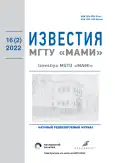Influence of heat-protective coatings on the temperature state of tractor diesel pistons
- Authors: Belov V.P.1, Apelinsky D.V.1, Bezhenar V.N.1
-
Affiliations:
- Moscow Polytechnic University
- Issue: Vol 16, No 2 (2022)
- Pages: 107-113
- Section: Heat engines
- URL: https://journal-vniispk.ru/2074-0530/article/view/126617
- DOI: https://doi.org/10.17816/2074-0530-106387
- ID: 126617
Cite item
Full Text
Abstract
BACKGROUND: The paper presents the results of thermometry of pistons with the TsNIDI type combustion chamber (CC) of the D-240 and the D-245 tractor diesel engines. Various constructive and technological measures aimed at increasing the thermal resistance of pistons are considered.
AIMS: To evaluate the effect of heat-protective coatings on the temperature state of pistons with the TsNIDI type combustion chamber.
METHODS: Motor bench tests of the D-240 and the D-245 diesel engines, equipped with pistons with heat-protective coatings (HPC) on the bottom, were carried out. In the process of research, the influence of the HPC on the thermal state of the pistons as well as on the power and economic indicators of these diesel engines was studied.
RESULTS: It is established that hard anodizing leads to a slight decrease in temperatures and their differences at characteristic points of the piston in stationary and non-stationary diesel operation modes. It is noted that the slow rise in temperature at the bottom of the piston is caused by a decrease in the amount of heat supplied to it due to the low thermal conductivity of the oxide layer. It is shown that the PN85Yu15 gas-plasma coating leads to a significant decrease in temperatures and their differences along the piston bottom. It is determined that this coating helps to reduce the specific effective fuel consumption due to the reduction of the ignition delay period in the combustion process. It is noted that a slower growth rate of temperatures and their differences, especially in the zone of the edge of the CC, should reduce the magnitude of thermal stresses, and therefore increase the thermal resistance of the experimental pistons.
CONCLUSIONS: It is revealed that the most effective way to reduce the heat stress of the piston is the application of heat-protective coatings on its bottom. The influence of the abovementioned coatings on the nature of the temperature distribution and their differences in the piston head is investigated.
Full Text
##article.viewOnOriginalSite##About the authors
Vyacheslav P. Belov
Moscow Polytechnic University
Email: belovmami@mail.ru
ORCID iD: 0000-0002-2031-669X
SPIN-code: 9146-3300
Cand. Sci. (Tech.), Professor
Russian Federation, MoscowDmitry V. Apelinsky
Moscow Polytechnic University
Email: apelinskiy_mami@mail.ru
ORCID iD: 0000-0003-2841-6895
SPIN-code: 2311-0480
Associate Professor, Cand. Sci. (Tech.)
Russian Federation, MoscowVadim N. Bezhenar
Moscow Polytechnic University
Author for correspondence.
Email: amadei.96@mail.ru
ORCID iD: 0000-0003-3747-2530
SPIN-code: 1733-6826
Head of the Laboratory
Russian Federation, MoscowReferences
- Belov VP, Apelinsky DV. Calculation and experimental method for assessing the thermal cyclic resistance of forced diesel pistons. Izvestiya MSTU MAMI. 2020;11(1):8–17. doi: 10.31992/2074-0530-2020-43-1-8-17 (In Russ).
- Belov VP, Apelinsky DV, Bezhenar VN. Experimental assessment of the temperature state of tractor diesel pistons. Tractors and agricultural machines. 2022;89(2):68–76. doi: 10.17816/0321-4443-105717 (In Russ).
- Belov VP. Computational and experimental assessment of the heat resistance of pistons of forced automobile and tractor engines [dissertation] Moscow; 1986. (In Russ).
- Glinkin SA. Research and prediction of durability of pistons of internal combustion engines [dissertation]. Vladimir; 2010. (In Russ).
- Lazarev EA, Ivashchenko NA, Perlov ML. Features of thermal and stress-strain state of tractor diesel pistons. Dvigatelestroyeniye. 1988;7:3–5. (In Russ).
- Lizunov AA. Heat resistance of pistons of automobile and tractor diesel engines under non-stationary operating modes [dissertation]. Moscow; 1988. (In Russ).
- Chainov ND, Timokhin AV, Ivanchenko AB. Evaluation of the fatigue life of a tractor diesel piston under cyclic loading.Dvigatelestroyeniye. 1990;11:14–15. (In Russ).
- Certificate of authorship No. 1012066 USSR / 15.04.83, Bull. № 14. Radzivan AS, Belov VL, Repin VP, et al. Stend dlya issledovaniya teplonapryazhennogo sostoyaniya porshnya dvigatelya vnutrennego sgoraniya. (In Russ).
- Belov VP, Apelinskiy DV. Computational and experimental method for assessing the thermal strength of high-loaded diesel engines. J. Phys.: Conf. Ser. 2021;2096:012204. doi: 10.1088/1742-6596/2096/1/012204
Supplementary files















